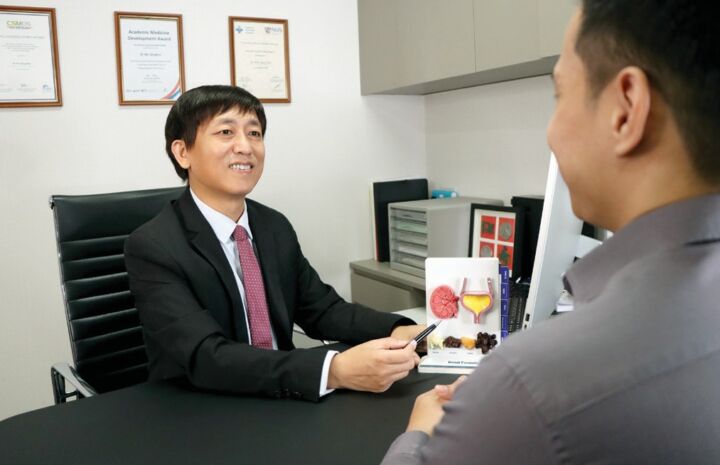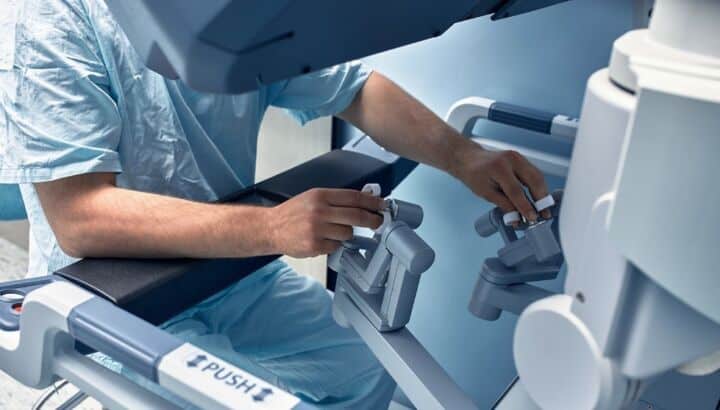Empowering Men Against Prostate Cancer

Prostate cancer is one of the most common types of cancer among men, particularly affecting those over the age of 50. According to Singapore Cancer Society (from 2017 – 2021), prostate cancer is the most common cancer for men. Understanding the disease, its symptoms, risk factors, diagnosis, treatment options, and preventive strategies can help in early detection and effective management.
What is prostate cancer?
The prostate is a small, walnut-sized gland located below the bladder. It is part of the male reproductive system, and its primary role is to produce seminal fluid (semen). Prostate cancer occurs when cells in the prostate gland grow uncontrollably. While some prostate cancers grow slowly and may not cause serious harm, others can be aggressive and spread quickly.
What are the symptoms of prostate cancer?
In the early stages, prostate cancer usually does not cause noticeable symptoms, which is why regular screening is important, especially for those at higher risk.
As the cancer progresses, it may lead to:
- Frequent urination at night
- Difficulty in starting or holding urine
- Inability to urinate
- Weak urine stream
- Pain when urinating
- Blood in the urine or semen
- Increased urge to urinate, especially during the day
- Pain or burning sensation during urination or ejaculation
- Discomfort in the pelvic area or lower back
- Erectile dysfunction

What are the risk factors for prostate cancer?
Several factors can increase a man’s risk of developing prostate cancer.
- Age: Risk of prostate cancer increases with age. Men who are aged 50 and above are at higher
- Race and ethnicity: African American men have a higher risk and are more likely to develop aggressive forms of prostate cancer. Asian men have a lower risk compared to white men.
- Family history: Having your father or brother diagnosed with prostate cancer increases your risk. The risk is even higher if multiple relatives are affected.
- Obesity: Obese men may be more likely to develop advanced prostate cancer and have a lower survival rate.
- Smoking: Long-term smoking has been linked to a greater risk of death from prostate cancer.
How is prostate cancer diagnosed?
If your doctor suspects you have prostate cancer, he or she may conduct these tests to confirm the symptoms:
Digital rectal exam |
Your doctor will insert a gloved finger into your rectum to inspect your prostate for any hard lumps, which may be indicative of prostate cancer. |
Blood test |
Your doctor may request for a blood test to check for prostate-specific antigen (PSA) cancer marker. |
Biopsy |
Prostate tissue samples will be taken and sent to the laboratory for testing. |

What are the treatment methods for prostate cancer?
Treatment options vary depending on the stage of cancer, patient’s age, overall health, and personal preferences. Consult your doctor to find out which treatment method best suit your needs. Common treatments include:
1. Close monitoring
Men with low-risk or slow-growing prostate cancer may not require immediate treatment. Your doctor may recommend regular follow-ups or testing to monitor the progression of your cancer. If the tests indicate your cancer is progressing, you will be advised to undergo treatment for the cancer.
2. Surgery
Surgery usually removes the entire prostate gland. At Raffles Hospital, we offer minimally invasive surgical option through robotic-assisted surgery using the da Vinci surgical system. This method is a proven surgical approach with benefits such as lower blood loss, shorter recovery time, and improved cancer control with good urinary continence outcomes.

3. Radiation
Radiation therapy uses high-powered X-ray to kill cancer cells, while minimising damage to healthy cells. Depending on your condition, radiation may be used as primary treatment for prostate cancer in conjunction with other treatments, or to kill any remaining cancer cells after surgery.
4. Hormonal therapy
Hormone medications may be given to slow down the growth of your prostate cancer, or prepare your body for other forms of treatment. Although this is a suitable treatment method for prostate cancer of any stage, it is usually used for recurring or advanced prostate cancer.
5. Chemotherapy
Chemotherapy is normally the treatment for late stage prostate cancer. Chemotherapy involves giving you anti-cancer drugs. These drugs enter your bloodstream and target the rapidly growing cancer cells.
Doctors give chemotherapy treatments in cycles, with each period of treatment followed by a rest period to allow the body time to recover. Chemotherapy cycles generally last two to four weeks, and treatment typically involves four to six cycles.

Can prostate cancer be prevented?
There is no guaranteed way to prevent prostate cancer, but certain lifestyle changes and medical strategies may help reduce the risk:
Lifestyle choices
- Eat a healthy diet
- Exercise regularly
- Maintain a healthy weight
- Avoid smoking
Conclusion
Prostate cancer is a significant health concern for men, particularly as they age. Early detection through routine screening and awareness of risk factors can lead to better outcomes. With modern technology such as the da Vinci surgical system, diagnosis and treatment have become more precise and less invasive. Maintaining a healthy lifestyle and being informed about the disease are essential steps in managing your risk.
If you are over 50 or have risk factors, speak with your healthcare provider about prostate cancer screening and prevention strategies.



